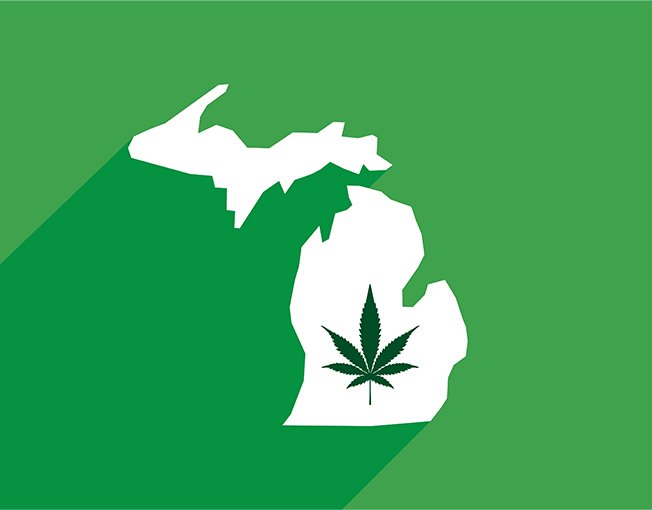Background
On Tuesday, Michigan became the nation’s 10th state, along with the District of Columbia, to legalize recreational cannabis with the passage of Proposal 18-1, also known as the Michigan Regulation and Taxation of Marijuana Act (MRTMA). 56% of Michiganders voting on the ballot initiative supported the measure. Formal legalization will likely occur in December 2018, as state law deems ballot initiatives effective 10 days after election results are certified.
MRTMA authorizes and legalizes the possession, use and cultivation of cannabis products by individuals at least 21 years of age. The new law allows individuals to possess up to 2.5 ounces of cannabis (according to the state’s police standards, the equivalent of 70 joints) and a total of 10 ounces at home. Additionally, residents may now grow up to 12 plants in their home for personal use but not for sale.
Michigan now joins Alaska, California, Colorado, Maine, Massachusetts, Nevada, Oregon, Vermont, Washington and Washington D.C. on the list of states and territories that have approved recreational cannabis. As a result, recreational cannabis is now legal in 1 of 5 states and 80 million Americans (roughly 25 percent of the nation’s population) now live in a state in which recreational cannabis is legal. On Tuesday, North Dakota voters rejected a ballot initiative to legalize recreational cannabis in North Dakota. For a summary and ranking of cannabis regulations in every state (as of prior to this most recent development), click here.
Impact on investors and entrepreneurs
The passage of Proposal 18-1 is expected to unleash significant investor and entrepreneurial activity in the Midwest as Michigan is now the first and only state in the region to legalize recreational cannabis use. The initiative is particularly business friendly, as described in more detail below.
This development caps a trend of increased cannabis acceptance among Michiganders, beginning with the enactment of the Michigan Medical Marijuana Act (MMMA) in 2008. MMMA authorized qualifying patients to possess up to 2.5 ounces of cannabis and to use it for medical purposes.
In recent years, certain municipalities have taken an increasingly relaxed stance. For example, Ann Arbor has decriminalized recreational cannabis and, in 2012, 74% of voters in Ypsilanti approved a municipal proposal declaring the possession or use of less than one ounce of cannabis to be the lowest priority for law enforcement.
Licensing system and taxation
Significantly, MRTMA establishes a state-wide licensing system for cannabis businesses in the state, but still allows municipalities to ban or restrict commercial cannabis activity. This framework is similar to California which legalized recreational cannabis but authorized local governments to regulate or altogether prohibit commercial cannabis activity in their respective municipalities. In the two years since California voters legalized recreational cannabis, over 80% of municipalities continue to ban commercial cannabis activities. For example, in Orange County, the Golden State’s third most populous county with over 40 cities, Santa Ana is the only city to permit cannabis retail sales.
The new Michigan law is aligned with the state’s regulatory framework governing medical cannabis, established in 2016 with the enactment of the Medical Marihuana Facilities Licensing Act (MMFLA). Under MMFLA, the state established the Medical Marihuana Licensing Board and created license categories for businesses engaging in commercial cannabis cultivation, processing, transportation, testing and selling activities.
A recent analysis conducted by the state’s Senate Fiscal Agency estimated legalized cannabis in Michigan will generate $287.9 million in new tax revenue in 2023, stemming from a 6 percent sales tax and 10 percent excise tax (paid by the retailer) on the purchase of recreational cannabis. The state imposes even lower tax rates on medical cannabis, levying a 3 percent provisioning center tax and a 6 percent sales and use tax. The state’s cannabis tax rate is one of the lowest in the country and the new law prohibits municipalities from levying their own cannabis taxes.
States with higher cannabis taxes, such as California, have faced difficulties combating the established black market which offers significantly lower prices to customers and higher profits to business owners due to the absence of taxes. Proponents of Michigan’s cannabis law argue a low tax rate will help deter and stifle the black-market. According to the State Budget Office, during fiscal year 2017 Michigan collected $28.5 billion in taxes, of which $7.8 billion was generated from sales tax.
Under MRTMA, tax revenues generated from recreational cannabis are to be first used to implement the new cannabis regulations. Thereafter, $20 million annually (through at least 2022) goes toward medical cannabis trials within a Michigan academic institution to research the efficacy of cannabis in treating medical conditions of U.S. veterans.
Any remaining tax revenue will then be split as follows: 15% to municipalities in which a cannabis retail store or microbusiness is located (allocated in proportion to the number of cannabis retail stores and cannabis microbusinesses within the municipality); 15% to counties in which a cannabis retail store or microbusiness is located (allocated in proportion to the number of cannabis retail stores and cannabis microbusinesses within the county); 35% to Michigan’s school aid fund to be used for K-12 education; and 35% to the state’s transportation fund to be used for repair and maintenance on roads and bridges.
Support for the proposal
Proposal 18-1 was drafted by the Coalition to Regulate Marijuana Like Alcohol. The initiative was funded in large part by the Washington D.C. based Marijuana Policy Project.
Industry advocates are touting the outcome in Michigan. Matthew Schwich, deputy director of the Marijuana Policy Project, issued a statement praising voters stating, “Adults will no longer be punished for consuming a substance less harmful than alcohol, and rather than having to resort to the illegal market, they will be able to access it safely and legally from licensed businesses.”
Regulation of the law
The new law requires the state to start accepting applications from cannabis businesses within 10 months. The recreational cannabis industry will be regulated by the state’s Department of Licensing and Regulatory Affairs (DLRA) which will promulgate rules and procedures for issuing cannabis licensing, establish licensing fees, prescribe qualifications for licensure and implement standards for testing, packaging and labeling cannabis products.
Michigan’s Senate Fiscal Agency’s analysis predicts DLRA will need 27 full-time regulatory and licensing staffers to manage the recreational cannabis program, costing the state $2.5 million. Industry insiders expect it to take more than a year for recreational dispensaries to commence retail sales.
Overproduction concerns and impact on employers
Although MRTMA does not impose a cap on state-issued licenses, municipalities can limit the number of licenses issued on the local level. This may reduce the risk of federal intervention in the state. In the past, states with an unlimited number of licenses have drawn increased scrutiny from the federal government which sought to discourage overproduction and curtail the illicit transportation of cannabis across state lines. The Department of Justice’s cannabis enforcement priorities are currently unclear following former Attorney General Jeff Sessions’ January 2018 revocation of the Cole Memorandum and Mr. Sessions’ resignation on November 7.
Although the new law legalizes recreational use of cannabis, Michigan employers will still be permitted to take disciplinary actions against employees, including terminating such individuals’ employment, for consuming cannabis. Additionally, employers may refuse to hire an individual on the basis of such person’s cannabis use. This is consistent with the rights granted to employers in California and other states.
Future outlook and historical significance
Although Proposal 18-1 establishes a regulatory framework that is favorable for cannabis entrepreneurs and investors, the new law grants significant authority to the DLRA and local governments. As a result, opportunities in The Great Lake State will ultimately hinge on the regulations to be established by the DLRA and municipalities in the months ahead.
Regardless of these future decisions on regulation, the passage of Proposal 18-1 signifies a historic event for the cannabis movement. Exactly six years after Oregon and Washington became the first two states to legalize recreational cannabis on November 6, 2012, Michiganders demonstrated the strength of the movement by making recreational cannabis a reality in the nation’s 10th most populous state. With 10 states and Washington D.C. on board, legal recreational cannabis is now available for 25% of all Americans. Despite ongoing federal prohibition, the recreational cannabis industry continues to emerge from the shadows and gain traction across the United States.
















